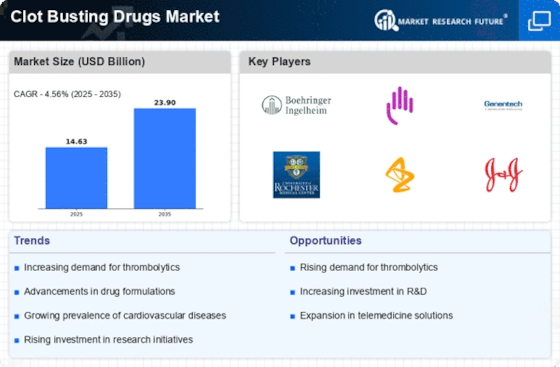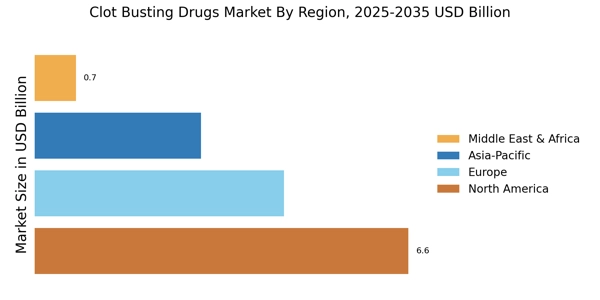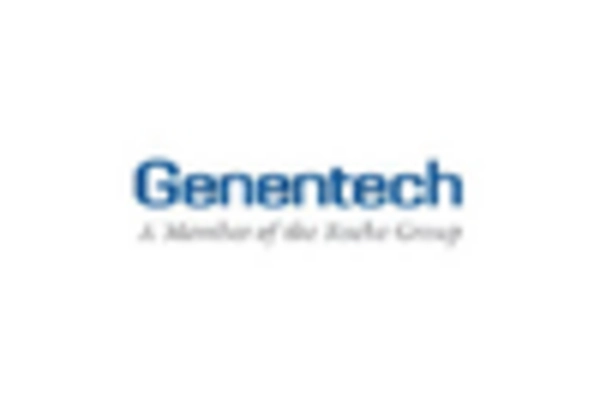Growing Geriatric Population
The expanding geriatric population is a significant factor influencing the Clot Busting Drugs Market. As individuals age, the risk of developing conditions such as thrombosis and other cardiovascular diseases escalates. According to demographic studies, the proportion of individuals aged 65 and older is projected to rise dramatically in the coming years, leading to an increased incidence of age-related health issues. This demographic shift necessitates the availability of effective clot-busting therapies tailored to the needs of older patients. Healthcare systems are increasingly focusing on providing timely and effective treatments to this vulnerable population, which in turn drives demand for clot-busting drugs. The market is likely to see a corresponding increase in the development of specialized formulations that cater to the unique physiological characteristics of elderly patients.
Increased Awareness and Education
The heightened awareness and education regarding stroke and heart attack symptoms are pivotal in driving the Clot Busting Drugs Market. Public health campaigns and educational initiatives have significantly improved recognition of the signs of these critical conditions, leading to quicker responses and treatment. As patients and healthcare providers become more informed about the importance of timely intervention, the demand for clot-busting medications is expected to rise. Moreover, the emphasis on training healthcare professionals in the latest treatment protocols further supports the market's growth. This increased awareness not only facilitates early diagnosis but also encourages patients to seek immediate medical attention, thereby enhancing the overall effectiveness of clot-busting therapies. Consequently, the market is likely to benefit from a more proactive approach to cardiovascular health.
Regulatory Support for Drug Approvals
Regulatory support for the approval of new clot-busting drugs is a crucial driver for the Clot Busting Drugs Market. Regulatory agencies are increasingly streamlining the approval processes for innovative therapies, recognizing the urgent need for effective treatments in acute cardiovascular conditions. This supportive environment encourages pharmaceutical companies to invest in research and development, leading to a more robust pipeline of clot-busting agents. Recent initiatives aimed at expediting the review of breakthrough therapies have resulted in faster access to life-saving medications for patients. As a result, the market is likely to experience a surge in new product launches, which will enhance treatment options available to healthcare providers. This regulatory landscape not only fosters innovation but also ensures that patients receive timely access to essential therapies.
Rising Incidence of Cardiovascular Diseases
The increasing prevalence of cardiovascular diseases is a primary driver for the Clot Busting Drugs Market. As per recent statistics, cardiovascular diseases account for a substantial portion of global mortality rates, leading to heightened demand for effective treatment options. The World Health Organization indicates that these diseases are responsible for approximately 31% of all deaths worldwide. This alarming trend necessitates the development and distribution of clot-busting medications, which are crucial in managing acute conditions such as heart attacks and strokes. Consequently, pharmaceutical companies are investing significantly in research and development to innovate and enhance the efficacy of these drugs. The growing awareness among healthcare professionals and patients regarding timely intervention further propels the market, as early treatment can significantly improve patient outcomes.
Technological Innovations in Drug Formulation
Technological advancements in drug formulation are transforming the Clot Busting Drugs Market. Innovations such as nanotechnology and targeted drug delivery systems are enhancing the effectiveness and safety profiles of clot-busting agents. For instance, the development of thrombolytic agents with improved pharmacokinetics allows for faster action and reduced side effects. The integration of advanced imaging techniques also aids in the precise administration of these drugs, ensuring that they reach the intended site of action efficiently. As a result, the market is witnessing a surge in the introduction of novel formulations that promise better patient compliance and outcomes. Furthermore, the increasing collaboration between pharmaceutical companies and technology firms is likely to accelerate the pace of innovation, thereby expanding the market's potential.

















